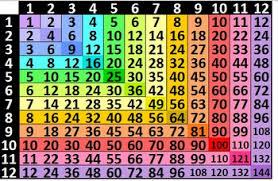I attended a County Primary school in the 1960s and as a result I have a good general background in numeracy and literacy. We were taught times tables, (of course there was no use of calculators back then), and I remember very well, being encouraged to learn and recite my times tables from 2 to 12 off by heart. Post decimalization generations may ask why up to 12. Well there were twelve pennies in a shilling and many products were sold in dozens. A gross was twelve dozen - 144.
That basic training and practice has always stood me in good stead and I am still able to recall a calculation instantly - no effort required. I am frequently amazed by younger people on TV quiz shows who cannot do simple multiplication in their heads. Of course, I am in awe of Carol Vorderman and Rachael Riley who perform mathematical gymnastics with incredible speed. Long live Countdown, a true test of numeracy and literacy.
We were also taught the principles of linear maths and volume using wooden blocks. The sets provided were made up of longs: strips comprising between three and twelve small cubes; flats comprising joined up longs and blocks: made up of stacked flats. They were both fascinating and useful, giving young students an appreciation of the actual dimensions of volume. Sheer genius.
At senior school, I developed a love of Algebra. From my introduction to quadratic equations, I was hooked and would seek out books of them to practice. What a swat! I really loved them. Someone should develop them as a quiz in newspapers. Much better than Sudoku.
I never really got to grips with Logarithms. I just couldn't see the point and was far happier when moving into further education that the calculator was in common use. My dad's much leafed Ready Reckoner, always on his desk, was always a source of intrigue. My older brother used a slide ruler at college and although it interested me, he never let me use it, so it's application still eludes me.
If called to add up columns of figures, I still work it manually. I suppose that as a child of the sixties, I am fortunate to have more strings to my bow than later generations, who are so reliant on technology to do the working out for them. I hope that this mental exercise will help keep Alzheimer's Disease at bay. I still delight in the eloquence of the nine times table, one side up, the other down, maths at its simple best.

Multiplication
A love of mathematics is a joy foreverthe sheer delight of calculationaddition, subtraction,multiplication or division,The eureka moment when algebraic computationbecomes a second languagerolling off the tongue. When trigonometrybecomes elementary;when graphs and pie chartsgive up their mystery.When columns alladd up satisfaction;when restaurant billsare shared out equallythe hard-earned skillsamassed through educationare equal to the sum of all life's trials.Thank you for reading. Adele Email ThisBlogThis!Share to TwitterShare to Facebook
